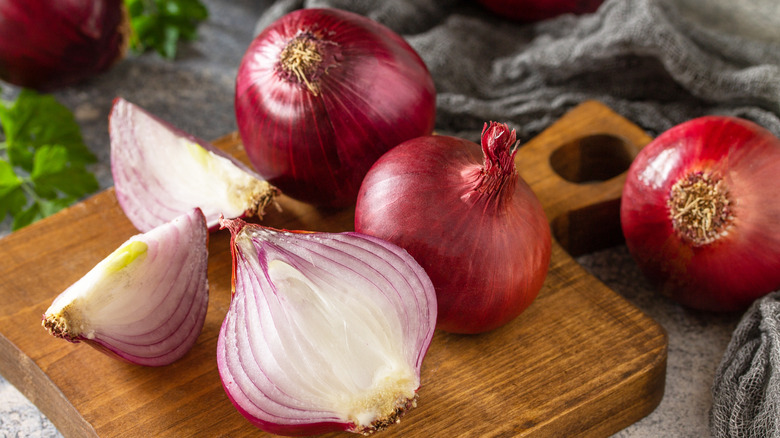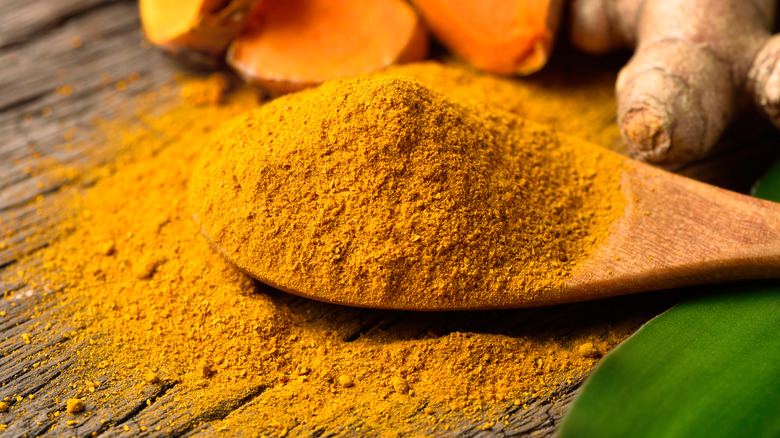Natural Antihistamines That May Help Treat Allergy Symptoms
Most people associate allergies with spring and summer when airborne pollen is at its highest levels. However, allergic rhinitis (also known as hay fever) can occur throughout the year (via Mayo Clinic). Pollen from trees and grass is one of the most common instigators, but numerous culprits can cause allergy symptoms to flare up, including dust mites, pet dander, and spores from mold.
Allergic rhinitis occurs when your body's immune system overreacts to allergens up in the air (via Asia Pacific Allergy). It registers these "foreign" particles as harmful pathogens and produces antibodies that release chemicals like histamine into your bloodstream. This gives rise to the various symptoms of hay fever, such as sneezing, itching, congestion, and watery eyes.
Around 7.8% of adults in the U.S. scramble to stave off hay fever, according to the American Academy of Allergy, Asthma, and Immunology (AAAAI). This is commonly treated with chemical antihistamines, per MedicalNewsToday. However, there's evidence that our dietary choices can help lessen and even get rid of some of the symptoms of hay fever and other allergic conditions. Here are some foods that might be your ally when those allergies kick in.
Onions
Quercetin is a polyphenol flavonoid that can be found in various foods and plants, reports a 2020 study published in Allergy, Asthma & Clinical Immunology. It's also a naturally occurring pigment that gives many fruits and vegetables their vivid colors (via Pharmacognosy Reviews).
As a potent antioxidant, quercetin has myriad health benefits, including the ability to help control allergies (via Allergy, Asthma & Clinical Immunology). It's believed that the chemical stops immune cells from releasing histamine in the body. As a result, it can help relieve and even prevent some of the grueling symptoms of allergic rhinitis and allergic asthma.
Being one of the richest sources of quercetin, onions may serve as natural antihistamines. Research shows that adding them to your diet may help bring down inflammation, improve immune function, and regulate allergic symptoms (via Nutrients). The red variety, in particular, can be applied topically to the skin to reduce allergic inflammatory reactions (via Scientific Reports).
In many countries, eating onions is an excellent way to top up on flavonoids since they're easy to grow and affordable throughout the year (via Nutrients). Onions have higher concentrations of quercetin in the outermost layers of the skin and in the area closest to the root. A significant amount of quercetin tends to be lost when the top layers of the onion are peeled away.
Apples
It turns out that an apple a day might actually help keep the sniffles away. Quercetin also naturally occurs in apples, making them an excellent inflammation suppressor and histamine inhibitor (via Allergy, Asthma & Clinical Immunology). Eating apples on a regular basis can be therapeutic for both allergic rhinitis and allergic asthma. Specifically, it can help relieve nasal symptoms like itching and sneezing and reduce the severity of asthma symptoms like mucus and wheezing.
Apples are also high in vitamin C, which works synergistically with quercetin to exert its antiviral effects, according to research (via Natural Product Communications). This dual power gives them a great medicinal quality to help strengthen your immune system and even fight off and prevent illnesses.
Apples are a simple and affordable way to get more quercetin into your diet, and they might actually be one of the best sources of flavonoid (via Molecules). Eat them unpeeled if you want to maximize your intake of antioxidants — the peel of an apple usually has much more antioxidant capacity and bioactivity than the flesh.
Research suggests that the quality of an apple matters when it comes to its antihistamine effects (via Nutrients). The amount of quercetin that's available in a piece of fruit varies depending on how and where it's been harvested and grown. Organically produced fruit was found to have around 79% more quercetin than chemically grown ones.
Pineapples
Pineapple is another favorite remedy when it comes to easing those allergy woes. Used since ancient times in traditional folk medicine, the super-food is often touted for its numerous healing properties (via Biomedical Reports). What makes the pineapple particularly special is the abundance of an enzyme called bromelain. This helps your body break down food, making it a great digestive aid. It's also known for warding off hay fever due to its anti-inflammatory, anti-microbial, and immunomodulatory effects.
Bromelain extracted from pineapple can help manage some of the irksome symptoms of allergic rhinitis, sinusitis, and asthma (via Biomedical Reports). It's been shown to help ease airway sensitivity to irritants by reducing the inflammation and swelling that occurs within the nasal passages and lungs. It can lower mucus levels and improve breathing in people who have allergic reactions.
Bromelain is present all throughout the pineapple plant, according to research (via Saudi Journal of Biological Sciences). There are high concentrations of the enzyme in the peel, stem, crown, and core — these parts tend to be discarded, as they're tougher and less juicy than the rest of the fruit. Bromelain is also sensitive to heat and might be destroyed if it's cooked for too long. Aim to consume it raw and unpasteurized if you want to make the most of its antihistamine potential.
Pineapples also contain other important nutrients, such as vitamin C, which helps the body combat free radicals and boosts immune health (via Heliyon).
Turmeric
Aside from being used for culinary purposes and celebrated as a spice for centuries, turmeric has gained attention for its anti-inflammatory prowess in recent years (via Molecules). Thanks to an active ingredient called curcumin, turmeric has become known as an effective, alternative treatment for people suffering from hay fever and other allergies.
Curcumin has the ability to yield an anti-allergic immune response and dampen the body's hypersensitivity to allergens like pollen (via Molecules). The bright yellow compound exerts its antihistamine effects by suppressing the production of pro-inflammatory cytokines. This, in turn, can alleviate nasal congestion and nasal symptoms like a runny nose and sneezing, note researchers (via Annals of Allergy, Asthma & Immunology).
A tasty turmeric tea may help get rid of some of the discomfort that goes hand in hand with hay fever, but don't forget that the medicinal benefits of the root vegetable lie in its active component: curcumin. Studies have shown that the chemical is poorly absorbed from the gut after being ingested in its natural form (via Molecular Nutrition & Food Research). Water soluble supplements and other effective methods of consumption are now available, which make it easier for curcumin to enter your bloodstream.





